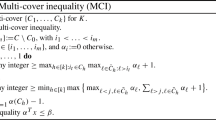Abstract
In this paper we consider combinatorial optimization problems whose feasible sets are simultaneously restricted by a binary knapsack constraint and a cardinality constraint imposing the exact number of selected variables. In particular, such sets arise when the feasible set corresponds to the bases of a matroid with a side knapsack constraint, for instance the weighted spanning tree problem and the multiple choice knapsack problem. We introduce the family of implicit cover inequalities which generalize the well-known cover inequalities for such feasible sets and discuss the lifting of the implicit cover inequalities. A computational study for the weighted spanning tree problem is reported.


Similar content being viewed by others
References
Aggarwal V, Aneja YP, Nair KPK (1982) Minimal spanning tree subject to a side constraint. Comput Oper Res 9:287–296
Agra A, Cerveira A, Requejo C, Santos E (2011) On the weight-constrained minimum spanning tree problem. In: Proceedings of the International Network Optimization Conference, volume 6701 of Lecture Notes in Computer Science, pp 156–161
Amado L, Bárcia P (1996) New polynomial bounds for matroidal knapsacks. Eur J Oper Res 95:201–210
Balas E, Jeroslow R (1972) Canonical cuts on the unit hypercube. SIAM J Appl Math 23:61–79
Balas E (1975) Facets of the knapsack polytope. Math Programm 8:146–164
Balas E, Zemel E (1978) Facets of the knapsack polytope from minimal covers. SIAM J Appl Math 34:119–148
Camerini PM, Vercellis C (1984) The matroidal knapsack: a class of (often) well-solved problems. Oper Res Lett 3:157–162
Crowder H, Johnson EL, Padberg MW (1983) Solving large-scale zero-one linear programming problems. Oper Res 31:803–835
Gu Z, Nemhauser GL, Savelsbergh MWP (1998) Lifted cover inequalities for 0–1 integer programs: Computation. INFORMS J Comput 10:427–437
Gu Z, Nemhauser GL, Savelsbergh MWP (2000) Sequence independent lifting in mixed integer programming. J Combin Optim 10:109–129
Hammer PL, Johnson EL, Peled UN (1975) Facets of regular 0–1 polytopes. Math Programm 8:179–206
Hassin R, Levin A (2004) An efficient polynomial time approximation scheme for the constrained minimum spanning tree problem using matroid intersection. SIAM J Comput 33:261–268
Henn ST (2007) Weight-constrained minimum spanning tree problem. Master’s thesis, University of Kaiserslautern, Kaiserslautern
Hong SP, Chung SJ, Park BH (2004) A fully polynomial bicriteria approximation scheme for the constrained spanning tree problem. Oper Res Lett 32:233–239
Kaparis K, Letchford AN (2008) Local and global lifted cover inequalities for the 0–1 multidimensional knapsack problem. Eur J Oper Res 186:91–103
Kaparis K, Letchford AN (2010) Separation algorithms for 0–1 knapsack polytopes. Math Programm 124:69–91
Klabjan D, Nemhauser GL, Tovey C (1998) The complexity of cover inequality separation. Oper Res Lett 23:35–40
Laurent M (1989) A generalization of antiwebs to independence systems and their canonical facets. Math Programm 45:97–108
Martello S, Toth P (1990) Knapsack problems: algorithms and computer implementations. Wiley, Chichester
Nemhauser GL, Wolsey LA (1988) Integer and combinatorial optimization. Wiley, New York
Pisinger D (2005) Where are the hard knapsack problems? Comput Oper Res 32:2271–2284
Ravi R, Goemans MX (1996) The constrained minimum spanning tree problem. In: Proceedings of the Scandinavian Workshop on Algorithmic Theory, volume 1097 of Lecture Notes in Computer Science, pp 66–75
Requejo C, Agra A, Cerveira A, Santos E (2010) Formulations for the weight-constrained minimum spanning tree problem. In: Proceedings of the International Conference on Numerical Analysis and Applied Mathematics, volume 1281 of AIP Conference Proceedings, pp 2166–2169
Requejo C, Santos E (2011) Lagrangean based algorithms for the weight-constrained minimum spanning tree problem. In: Proceedings of the VII ALIO/EURO Workshop on Applied Combinatorial Optimization, pp 38–41
van Roy TJ, Wolsey LA (1987) Solving mixed integer programming problems using automatic reformulation. Oper Res 35:45–57
Shogan A (1983) Constructing a minimal-cost spanning tree subject to resource constraints and flow requirements. Networks 13:169–190
Wolsey LA (1975) Facets for a linear inequality in 0–1 variables. Math Programm 8:165–178
Yamada T, Watanabe K, Kataoka S (2005) Algorithms to solve the knapsack constrained maximum spanning tree problem. Int J Comput Math 82:23–34
Zemel E (1989) Easily computable facets of the knapsack polytope. Math Oper Res 14:760–765
Acknowledgments
Research partially funded by CIDMA (Centro de Investigação e Desenvolvimento em Matemática e Aplicações) through the FCT (Fundação para a Ciência e a Tecnologia) within project PEst-OE/MAT/UI4106/2014, and by FCT through program COMPETE: FCOMP-01-0124-FEDER-041898 within project EXPL/MAT-NAN/1761/2013.
Author information
Authors and Affiliations
Corresponding author
Rights and permissions
About this article
Cite this article
Agra, A., Requejo, C. & Santos, E. Implicit cover inequalities. J Comb Optim 31, 1111–1129 (2016). https://doi.org/10.1007/s10878-014-9812-3
Published:
Issue Date:
DOI: https://doi.org/10.1007/s10878-014-9812-3




